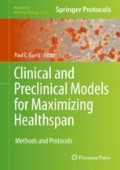Abstract
This chapter presents a protocol for assessing the effects dietary seafood consumption on depressive symptoms. We designed a cross-sectional study of 206 participants recruited in two Torres Strait Island communities. Depressive symptoms were assessed using the adapted Patient Health Questionnaire-9 (aPHQ-9), diet was analyzed with a structured questionnaire, omega-3 and omega-6 fatty acid concentrations were measured via a capillary dried blood spot system, and plasma levels of triglycerides and cholesterol were measured by gas-phase chromatography. Finally, we tested the relationship between seafood consumption, blood lipid concentrations, and depression scores using independent samples t-tests and a logistic and quantile regression model.
Access this chapter
Tax calculation will be finalised at checkout
Purchases are for personal use only
References
Holub BJ (1988) Dietary fish oils containing eicosapentaenoic acid and the prevention of atherosclerosis and thrombosis. CMAJ 139(5):377–381
Skerrett PJ, Hennekens CH (2003) Consumption of fish and fish oils and decreased risk of stroke. Prev Cardiol 6(1):38–41
Pauwels EK, Volterrani D, Mariani G, Kairemo K (2009) Fatty acid facts, Part IV: docosahexaenoic acid and Alzheimer’s disease. A story of mice, men and fish. Drug News Perspect 22(4):205–213
Szymanski KM, Wheeler DC, Mucci LA (2010) Fish consumption and prostate cancer risk: a review and meta-analysis. Am J Clin Nutr 92(5):1223–1233
Simopoulos AP (2008) The importance of the omega-6/omega-3 fatty acid ratio in cardiovascular disease and other chronic diseases. Exp Biol Med 233:674–688
Thota RN, Ferguson JJA, Abbott KA, Dias CB, Garg ML (2018) Science behind the cardio-metabolic benefits of omega-3 polyunsaturated fatty acids: biochemical effects vs. clinical outcomes. Food Funct 9(7):3576–3596
Parker G, Gibson NA, Brotchie H, Heruc G, Rees AM, Hadzi-Pavlovic D (2006) Omega-3 fatty acids and mood disorders. Am J Psychiatry 163(6):969–978
Calder PC, Yaqoob P (2009) Omega-3 polyunsaturated fatty acids and human health outcomes. Biofactors 35(3):266–272
Matsuoka YJ, Sawada N, Mimura M, Shikimoto R, Nozaki S, Hamazaki K et al (2017) Dietary fish, n-3 polyunsaturated fatty acid consumption, and depression risk in Japan: a population-based prospective cohort study. Transl Psychiatry 7(9):e1242. https://doi.org/10.1038/tp.2017.206
Assies J, Pouwer F, Lok A, Mocking RJ, Bockting CL, Visser I et al (2010) Plasma and erythrocyte fatty acid patterns in patients with recurrent depression: a matched case-control study. PLoS One 5(5):e10635. https://doi.org/10.1371/journal.pone.0010635
Lin PY, Huang SY, Su KP (2010) A meta-analytic review of polyunsaturated fatty acid compositions in patients with depression. Biol Psychiatry 68(2):140–147
McNamara RK, Jandacek R, Rider T, Tso P, Dwivedi Y, Pandey GN (2010) Selective deficits in erythrocyte docosahexaenoic acid composition in adult patients with bipolar disorder and major depressive disorder. J Affect Disord 126(1–2):303–311
McNamara RK (2016) Role of omega-3 fatty acids in the etiology, treatment, and prevention of depression: Current status and future directions. J Nutr Intermed Metab 5:96–106
Hibbeln JR (1998) Fish consumption and major depression. Lancet 351(9110):1213. https://doi.org/10.1016/S0140-6736(05)79168-6
Simopoulos AP (2011) Evolutionary aspects of diet: The omega-6/omega-3 ratio and the brain. Mol Neurobiol 44(2):203–215
Brown A, Mentha R, Rowley K, Skinner T, Davy C, O’Dea K (2013) Depression in aboriginal men in central Australia: adaptation of the patient health questionnaire 9. BMC Psychiatry 13(1):271. https://doi.org/10.1186/1471-244X-13-271
Bae JH, Kim G (2018) Systematic review and meta-analysis of omega-3-fatty acids in elderly patients with depression. Nutr Res 50:1–9
https://apps.who.int/iris/bitstream/handle/10665/254610/WHO-MSD-MER-2017.2-eng.pdf?sequence=1
http://www.abs.gov.au/ausstats/abs@.nsf/Lookup/9F3C9BDE98B3C5F1CA257C2F00145721?opendocument
Taylor S, McDermott R, Thompson F, Usher K (2016) Depression and diabetes in the remote Torres Strait islands. Health Promot J Aust 28(1):59–66
Berger M, Taylor S, Harriss L, Campbell S, Thompson F, Jones S et al (2018) Cross-sectional association of seafood consumption, polyunsaturated fatty acids and depressive symptoms in two Torres Strait communities. Nutr Neurosci 3:1–10. https://doi.org/10.1080/1028415X.2018.1504429
Liu G, Mühlhäusler BS, Gibson RA (2014) A method for long term stabilisation of long chain polyunsaturated fatty acids in dried blood spots and its clinical application. Prostaglandins Leukot Essent Fat Acids 91(6):251–260
Grosso G, Micek A, Marventano S, Castellano S, Mistretta A, Pajak A et al (2016) Dietary n-3 PUFA, fish consumption and depression: a systematic review and meta-analysis of observational studies. J Affect Disord 205:269–281
Berk M (2004) Dietary omega-3 fatty acids and depression in a community sample. Nutr Neurosci 7(2):101–106
Hoffmire CA, Block RC, Thevenet-Morrison K, van Wijngaarden E (2012) Associations between omega-3 poly-unsaturated fatty acids from fish consumption and severity of depressive symptoms: an analysis of the 2005-2008 National Health and Nutrition Examination Survey. Prostag Leukot Fatty Acids 86(4–5):155–160
Hackett ML, Farnbach S, Glozier N, Skinner T, Teixeira-Pinto A, Askew D et al (2016) Getting it right: Study protocol to determine the diagnostic accuracy of a culturally-specific measure to screen for depression in Aboriginal and/or Torres Strait Islander people. BMJ Open 6(12):e015009. https://doi.org/10.1136/bmjopen-2016-015009
Acknowledgments
This work was funded by NHMRC Grant GNT0631947 and by the Centre for Chronic Disease Prevention. We thank all study participants and their families of the Waiben and Mer communities, as well as the Torres and Cape Hospital and Health Service Primary Health Care and Mental Health teams, the Mer Island Primary Health Care Centre team, and JCU medical and dental students.
Author information
Authors and Affiliations
Corresponding author
Editor information
Editors and Affiliations
Rights and permissions
Copyright information
© 2020 Springer Science+Business Media, LLC, part of Springer Nature
About this protocol
Cite this protocol
Berger, M., Amminger, G.P., McDermott, R., Guest, P.C., Sarnyai, Z. (2020). Testing the Effects of Dietary Seafood Consumption on Depressive Symptoms. In: Guest, P. (eds) Clinical and Preclinical Models for Maximizing Healthspan. Methods in Molecular Biology, vol 2138. Humana, New York, NY. https://doi.org/10.1007/978-1-0716-0471-7_15
Download citation
DOI: https://doi.org/10.1007/978-1-0716-0471-7_15
Published:
Publisher Name: Humana, New York, NY
Print ISBN: 978-1-0716-0470-0
Online ISBN: 978-1-0716-0471-7
eBook Packages: Springer Protocols

